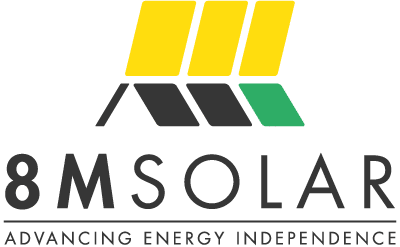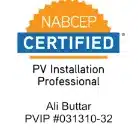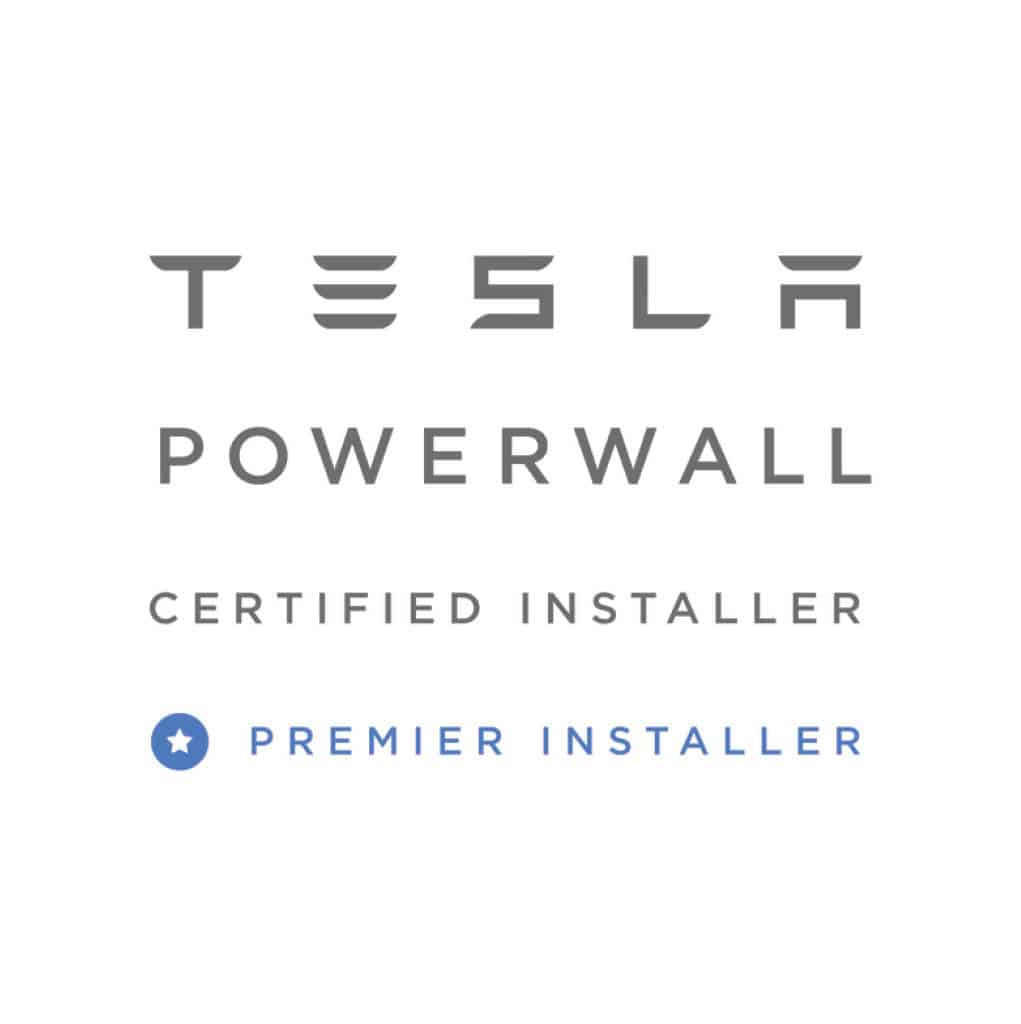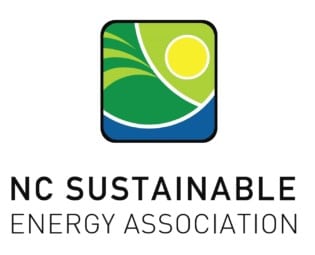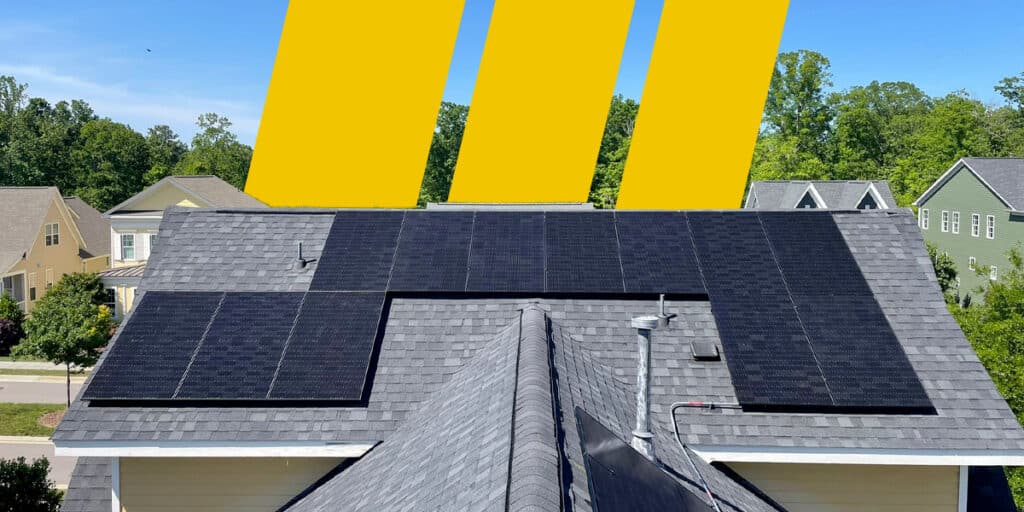
Solar panel installation offers many advantages for your home, including lower electricity bills, energy independence, and clean energy production. When considering solar panels, you have to evaluate factors like energy efficiency, appearance, and costs—all essential elements that will influence your decision. One of the most important aspects is choosing the right type of solar panels.
Your situation and goals will ultimately determine which solar panel is best for you. This guide outlines the different types of solar panels available today, their benefits, and how to select the ideal panels for your needs.
Table of Contents
- What Types of Solar Panels Are Available and What Are They Made Of?
- What Happened to Polycrystalline Solar Panels?
- What Does Each Solar Panel Look Like?
- Comparing Solar Panel Types
- Other Factors to Consider for Your Solar Panels
- Applications and Installation for Each Type of Solar Panel
- Which Type of Solar Panel Is Best?
- Best Solar Panels on the Market by Brand
- The Future of Solar
What Types of Solar Panels Are Available and What Are They Made Of?
The solar market has evolved, with today’s installations mainly focused on two types of solar panels: monocrystalline and thin-film solar panels. While polycrystalline panels were once common, they are no longer being installed or sold as the industry has shifted toward more efficient technologies. Each type of solar cell is manufactured differently and has a distinct aesthetic appearance. Here’s a breakdown of each type:
1. Monocrystalline Solar Panels

Monocrystalline solar panels are recognized for their high efficiency and sleek design, making them the premier choice for homeowners and businesses. Crafted from pure silicon, these panels are the most advanced solar technology available, delivering exceptional performance in a compact design.
How Are They Made? Monocrystalline panels are created using the Czochralski method:
- Molten Silicon: A pure silicon crystal is placed in a vat of molten silicon.
- Crystal Formation: The crystal is carefully pulled out, forming a solid cylindrical ingot.
- Thin Wafers: The ingot is precisely sliced into thin silicon wafers, which are then transformed into solar cells.
- Panel Assembly: The cells are arranged into a solar panel, with small gaps between them for peak performance.
The cells appear black due to the pure silicon, while the frames and back sheets are available in various colors to complement different architectural styles.
Why Choose Monocrystalline Panels?
- Superior Efficiency: These panels convert more sunlight into electricity, making them ideal for homes with limited roof space.
- Exceptional Durability: They last longer and usually come with extensive warranties, like 8MSolar’s 25-year guarantees.
- Elegant Appearance: Their black color and customizable frames create a visually appealing aesthetic for your home.
Things to Consider
While monocrystalline panels are the gold standard in solar technology, they do come at a premium price point. However, their long-term energy savings and superior performance make them a worthwhile investment for those seeking maximum output and reliability.
Monocrystalline panels combine exceptional performance with style, making them the leading choice for modern solar installations.
2. Thin-Film Solar Panels

Thin-film solar panels are the most versatile type of solar technology available today. Unlike traditional panels that rely solely on silicon, these innovative panels can be manufactured from a variety of materials, including:
- Copper Indium Gallium Selenide (CIGS)
- Cadmium Telluride (CdTe)
- Amorphous Silicon (a-Si)
How Are They Made? The manufacturing process involves layering the chosen material between thin sheets of conductive material, with a protective top layer of glass. For example, a-Si panels use non-crystalline silicon covered with glass to shield the photovoltaic cells.
Key Features
- Ultra-Thin Design: Thin-film panels are approximately 350 times thinner than traditional silicon-based panels, giving them a sleek, lightweight profile.
- Versatile Appearance: Panel colors vary based on the materials used, but typically appear in black or blue hues. While the frames may resemble those of monocrystalline panels, the thin-film cells stand out because of their distinctive slim profile.
Why Choose Thin-Film Panels?
- Flexibility: Ideal for unconventional installations, thin-film panels can adapt to curved or uneven surfaces like specialized roofs, vehicles, or portable setups.
- Lightweight Construction: Their reduced thickness makes them easier to transport and install, especially for large-scale commercial projects.
- Aesthetic Integration: With their sleek appearance, these panels blend seamlessly with modern architectural designs.
Considerations for Thin-Film Panels
While their flexibility and design versatility are unmatched, thin-film panels have lower efficiency and a shorter lifespan compared to monocrystalline options. Their affordability and adaptability make them an excellent choice for specialized applications where traditional panels wouldn’t be suitable.
Whether you’re powering a portable setup, integrating solar into a vehicle, or designing a curved installation, thin-film solar panels offer an innovative energy solution for specialized needs.
What Happened to Polycrystalline Solar Panels?
Polycrystalline solar panels, once a popular mid-range option in the solar market, are no longer being installed or sold. This shift has occurred as advancements in monocrystalline technology have made these premium panels more cost-effective to manufacture, while offering superior efficiency and aesthetics.
Previously, polycrystalline panels were created by melting multiple silicon fragments together and cooling them in a mold to form a solid block. This process resulted in their characteristic blue hue and made them more affordable than monocrystalline panels, though less efficient. As manufacturing techniques for monocrystalline panels have improved, the cost gap has narrowed, making the lower-performing polycrystalline technology obsolete in today’s market.
Most solar energy providers have transitioned to offering monocrystalline and thin-film options, making sure customers receive the best performance and value for their investment.
What Does Each Solar Panel Look Like?
Monocrystalline panels are black due to how light interacts with the pure silicon crystal. The back panels generally come in white, silver, or black, with either silver or black frames, providing a sleek, uniform appearance that many homeowners prefer for its modern aesthetic.
Thin-film panels offer a different visual profile compared to monocrystalline options. These panels are slimmer and can create a distinctive look for your property. Depending on the materials used, thin-film systems appear in black or blue hues, with a less textured appearance than crystalline panels.
Comparing Solar Panel Types
Beyond manufacturing methods and appearance, there are differences in how each type of solar panel performs. The main differentiating factors are efficiency and price.
Efficiency
Efficiency measures how much energy a solar panel can produce from the sunlight it receives, determining the power output of your system. While there are different ways to optimize solar panel efficiency, some panels are designed to be more efficient from the outset.
Monocrystalline solar panels lead the market with efficiency ratings exceeding 20%. These high-performance panels generate more than 300 watts per panel, with premium models producing over 400 watts. This higher efficiency makes them ideal for installations where space is limited or maximum power generation is desired.
Thin-film panels offer efficiency ratings between 7% and 18%, lower than monocrystalline options. The power capacity of thin-film panels varies because there is no standard size, and some models may produce more power than others.
Cost
Price is often a factor in solar decisions, and the type of solar cells you choose impacts overall costs.
Thin-film panels are generally the most affordable option due to lower manufacturing costs. Among thin-film technologies, CdTe panels are the most economical, while CIGS variants are more expensive. Their lightweight frames can also reduce installation expenses compared to heavier alternatives.
Monocrystalline panels are a premium investment. While previously the most expensive option, manufacturing advancements have made them more accessible while maintaining their performance. The production of pure silicon remains somewhat costly, and the panels and frames are heavier, which can influence installation expenses.
It’s important to remember that beyond the panels themselves, there are additional costs to consider, including installation, mounting hardware, and monitoring systems.
Other Factors to Consider for Your Solar Panels
Beyond efficiency and cost, several factors should influence your solar panel selection. Evaluating lifespan, temperature coefficient, and weather resistance will help determine the best solar panels for your home or business.
Life Span
Durability is a crucial consideration—you want panels that will remain operational for as long as possible to maximize your return on investment.
Monocrystalline panels offer the industry’s longest lifespan, ranging from 25 to 40 years. This extended operational life makes them a sound long-term investment despite their higher initial cost.
Thin-film panels have a shorter lifespan, generally between 10 and 20 years. While the upfront investment may be lower, their shorter operational life means you might need to replace them sooner.
Regardless of the type you choose, quality solar panels should generate enough energy savings over their lifetime to offset their initial cost several times over.
Temperature Coefficient
The temperature coefficient indicates how a panel’s performance changes as temperature rises—a big consideration in warm climates like North Carolina.
Monocrystalline panels have temperature coefficients around -0.3% to -0.5% per degree Celsius, meaning they lose a small percentage of efficiency as temperatures rise.
Thin-film panels generally perform better in high temperatures, with coefficients closer to -0.2% per degree Celsius. This makes them somewhat more efficient in extremely hot conditions, though their overall efficiency remains lower.
Fire Resistance, Hail Resistance, and Hurricane Rating
Weather resilience is essential for any solar installation, especially in regions prone to severe conditions.
Fire ratings classify materials based on their ability to resist flames:
- Class A: Minimizes flames to 6 feet and effectively stops fire spread—recommended for areas with wildfire risks.
- Class B: Protects against moderate fires, preventing flames from exceeding 8 feet.
- Class C: Offers protection only against light fire exposures, allowing flames to reach up to 13 feet.
Hail resistance is another critical factor. Most monocrystalline panels can withstand hailstones up to 25mm in diameter falling at approximately 50 miles per hour, though specific ratings vary by manufacturer.
For hurricane protection, look for panels with:
- High ratings for wind and snow loading
- Fasteners with secure locking capabilities
- Through-bolted modules rather than clamped fixtures
- Triple-frame rail systems for enhanced rigidity
- Protective fencing to reduce wind forces
Advanced Technologies and Certifications
Consider investigating heterojunction solar cell technology (HJT), which combines monocrystalline silicon wafers with amorphous silicon. HJT offers peak efficiency with minimal temperature coefficient and no Light Induced Degradation (LID).
While understanding the basics of solar panel technology is valuable, selecting the right type can be overwhelming. Our solar experts at 8MSolar are available to assess your specific needs and help you make the best decision for your situation.
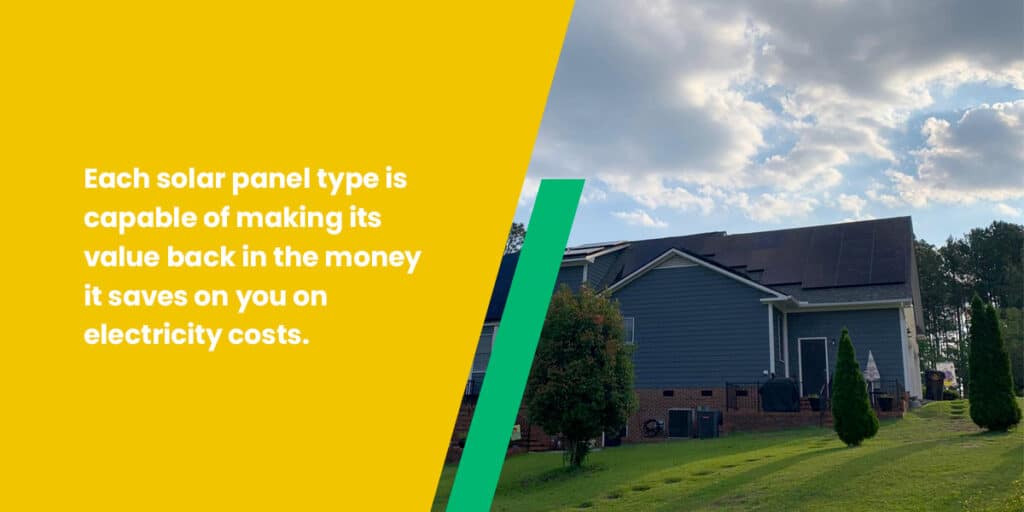
Applications and Installation for Each Type of Solar Panel
Understanding the defining characteristics of each solar panel type helps determine which is best for your needs. The ideal panel depends on your installation location and intended purpose.
For most residential properties, monocrystalline solar panels are now the standard choice. These high-efficiency panels work exceptionally well for large and small spaces, offering the best balance of performance and aesthetics for homeowners wanting to maximize energy production and savings.
Thin-film solar panels are rarely used in residential applications because of their lower efficiency. Instead, they’re primarily employed in commercial settings where conventional panels might be impractical due to weight constraints or unusual installation surfaces. Despite their lower efficiency, commercial buildings often have extensive roof space to compensate with larger installations.
Which Type of Solar Panel Is Best?
After reviewing the various solar panel types and their characteristics, your final decision will depend on your specific situation—consider what matters most to you when choosing your solar solution.
Evaluate these factors in your decision-making process:
- Function: Determine your motivation for installing solar. Are you focused on reducing your energy bills, decreasing your carbon footprint, or achieving energy independence? Your main objective will help guide your panel selection.
- Space: Assess your available installation area and energy needs. A compact home with limited roof space will benefit most from high-efficiency monocrystalline panels, while larger properties might have more flexibility.
- Budget: Establish a realistic price range for your solar investment. While staying within budget is important, remember that solar is a long-term investment—sometimes spending more initially on higher-quality panels can yield better returns over time.
Keep these considerations in mind as you explore solar options. While understanding the technical differences between panel types is helpful, consulting with solar professionals can provide invaluable guidance in selecting the perfect product for your needs.
Best Solar Panels on the Market by Brand
At 8MSolar, we take pride in being a design- and engineering-focused solar firm capable of installing virtually any make and model of solar panels. Our team evaluates all available options to identify the best fit for each homeowner’s needs—prioritizing performance, warranty strength, company stability, and long-term support. Among the many choices, Canadian Solar stands out as our top recommendation, followed closely by REC and Qcells.
Canadian Solar
Canadian Solar offers some of the most advanced and reliable solar panels available today. Their high-performance modules are proudly manufactured in the United States using N-Type TOPCon cell technology, which provides higher efficiency, better temperature tolerance, and superior long-term performance compared to standard panels. These panels are ideal for homeowners who want maximum output, trusted quality, and to support domestic manufacturing. With strong warranties and a growing U.S. manufacturing footprint, Canadian Solar is a smart and future-ready investment for any solar project.
Qcells
Qcells continues to be a leading choice for high-efficiency solar panels at competitive prices. Their Q.TRON series (420–440 watts) features advanced technology and strong warranties, including a 25-year power output guarantee of at least 90.58% in year 25 and a 25-year product warranty. Qcells also operates North America’s largest solar panel manufacturing facility, located near Atlanta, Georgia—making them a reliable, made-in-America option.
REC Group
REC Group produces top-tier premium panels like the REC Pure-RX 460W, known for delivering excellent long-term performance. These panels guarantee 92% of their initial output after 25 years—an industry best. As a certified REC ProTrust Installer, 8MSolar is able to offer clients REC’s extended warranty program, adding another layer of peace of mind.
Honorable Mentions
Silfab Elite 420W Panels
Made in the U.S., the Silfab SIL-420 BG features innovative back-contact technology and a sleek, all-black design. With 21.9% module efficiency and a 30-year power performance guarantee, these panels deliver both durability and curb appeal.
Panasonic EverVolt HK2 Panels
Panasonic’s HK2 Black Series panels use heterojunction technology and gapless cell connections to deliver up to 22.2% efficiency. They perform especially well in high-temperature conditions and come with a 25-year warranty covering performance, product, parts, and labor.
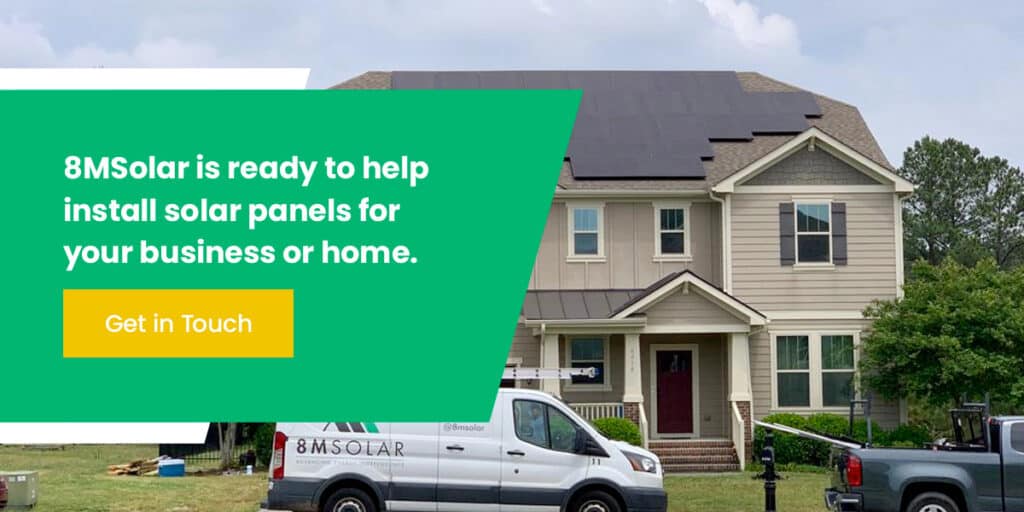
The Future of Solar
If you’re uncertain which solar panel type will work best for your project or need guidance understanding solar technology, our experts at 8MSolar can help determine the ideal panels for you.
At 8MSolar, we provide affordable, effective solar solutions for residential and commercial customers. From expertise to energy savings, we offer numerous advantages:
- Expertise: We assign a dedicated local project manager to each customer, ensuring effective communication, continuous engagement, and quality installation throughout the process. These professionals have extensive construction and engineering experience, guaranteeing proper panel installation and giving you confidence that an experienced professional is overseeing your project.
- Quality products: We offer our customers the latest, highest-quality products available. You can trust the durability and effectiveness of our installations, and if issues arise, our engineers promptly respond with necessary repairs.
- Value: We deliver unmatched value by combining premium panels with competitive pricing. Even with budget constraints, we’ll help you find solar solutions that effectively meet your energy and savings goals. Our streamlined business model eliminates unnecessary costs, making solar more affordable for our customers.
- Savings: Once installed, your solar panels will quickly begin generating energy savings. Solar represents an investment in your future that continues paying dividends for decades.
8MSolar stands ready to install solar panels for your business or home. With our expertise, quality products, competitive prices, and impressive savings potential, 8MSolar is your ideal solar partner. Contact us today to begin finding the perfect solar solution for your needs.
